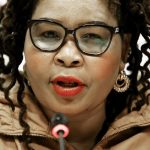On Friday 22 November the Right to Protest organisation held a panel discussion at the Wits Law School titled: “Violent protests and civil society: where to from here?”. The panel comprised SERI director of litigation Nomzamo Zondo, advocate Tembeka Ngcutaitobi SC, and Right to Protest attorney Stanley Malematja and was facilitated by the director of the Centre for Applied Legal Studies, Tshepo Madlingozi.
Zondo set the scene, stating that in South Africa protest violence conjured up images of the protesters being violent as opposed to those responding to the protest being violent. In support of this she mentioned the Marikana massacre and the Fees Must Fall protests. Ngcukaitobi took this narrative further back, to the Sharpeville massacre, the June 16 protests and the Bisho massacre. These peaceful protests were met with violence by the authorities and the South African Police Service (SAPS). Yet, the protesters were often the ones painted as violent.
Zondo discussed the “shifting sands” of what is considered violent action, and who is punished and criminalised for protest violence. At Marikana for instance, the police who responded are yet to face accountability for their actions.
Zondo said the narrative needs to shift from protesters being criminals to them being people who are fighting for their rights as South Africans. The state needed to appreciate and respond to the political nature of protests by engaging political and not legal solutions.
Ngcukaitobi said the right to protest was constitutionally guaranteed, which was directly precipitated by the history of struggle in South Africa, and as such everyone has the right to protest. He tracked the state’s violent response to people’s rights from the time of colonialism to apartheid and the current day, and said this response showed few signs of abating.
He explained that the state’s response of criminalising protesters was guided by the apartheid-era Riotous Assemblies Act of 1956 that was used to oppress and brutalise South Africans fighting for liberation.
“If we are to peacefully address the violence in protests, we need to start by dismantling the laws that permit the violence,” said Ngcukaitobi.
He said the constitutional project is incomplete, a reality that leaves many questions and gaps to be addressed in vindicating rights. He was emphatic in stating that the role of lawyers was not to be revolutionary but to protect the rights of citizens as enshrined in the Constitution.
Malematja, in contextualising the violence of protests, said the police were meant to fire rubber bullets at the ground next to protesters and not directly at people as frequently happens. Yet, there have been no sanctions and the police continue to act violently and illegally, he said.
He discussed the role of the media and how protests are often shown from the side of the police, creating the impression of violent crowds and showing the SAPS response as being defensive, not offensive.
This exchange happened against the backdrop of Fees Must Fall student activist Kanya Cekeshe having been jailed for violence and malicious damage to property. The panel referred to the apartheid tactics of isolating protesters as a form of dissipation and intimidation against protest action in reference to Cekeshe.
The conclusion was that what is lawful and unlawful is contested and is not finite. The real challenge is to engage deeply enough with the legal frameworks to show that people are not working outside of the law when protesting.
From the discussion, it was clear that there needs to be a collective responsibility for protests and a greater understanding of people’s constitutional guarantees. There also needs to be accountability on the part of authorities in responding to peaceful protests, by not looking at protesters as criminals to be subdued. MC





















 Become an Insider
Become an Insider